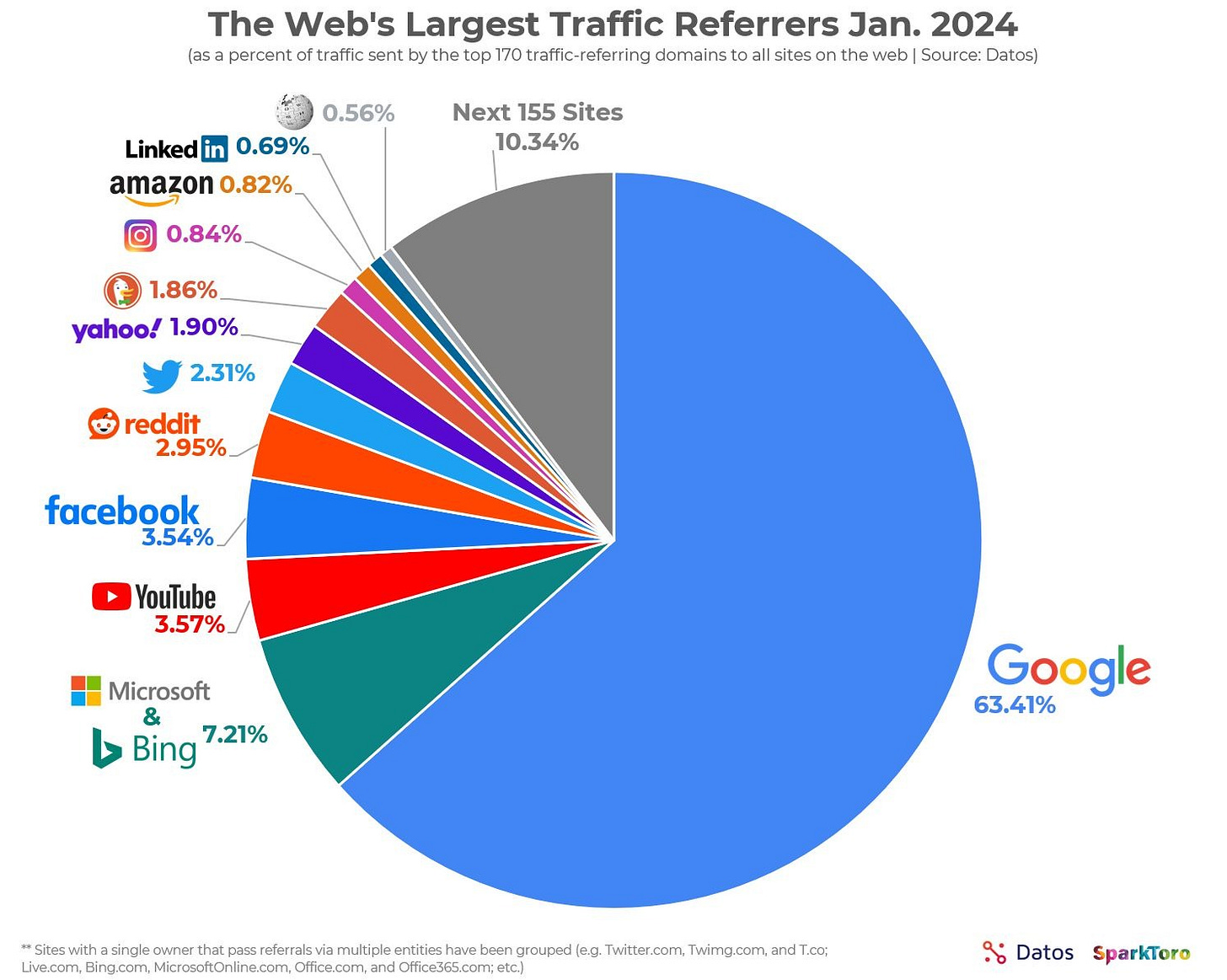Google Lands Another Bombshell Update On Publishers
It's that time of year again, but this one is multi-faceted and is likely to lead to another protracted period of algorithmic shifts
Google has released a seismic March update which has taken on AI spammers, and (apparently) sent a message for what is acceptable if you want to rank on what remains, comfortably, the world’s biggest front page for news content (see below).
There’s also an underlying core update that will take at least a month to complete, which is likely to have broad volatility that will impact organic search, top stories and Discover.
But what does it actually mean for news publishers?
Let’s first of all outline what Google is going after with this update.
Google March 2024 Update
Three clear things:
Spam Content: Sites, almost certainly using AI, utilising ChatGPT and other products to mass produce content targeting keywords. This covers everything from reducing low quality content to scaled content abuse. Basically if your site was doing a lot of obviously AI-driven activities, this might be the end for you.
Site Reputation Abuse: This is focused on sites that have sections built within the site map that have sections largely unrelated to their general content offering, but are used to ‘piggyback’ on in order for a weak domain to establish a high position in the rankings. This is slightly more pervasive than sheer spam and we’ll come back to that in a moment.
Expired Domain Abuse: This is more technical and likely the least used method. But the rationale here is that the older a domain is, the more likely Google is to give it prominence in the algorithm and, therefore, actors were buying up old domains and repurposing them for their own content farms.
If you want a clearer indication of what these terms actually mean, it’s always worth reading Barry Adams’ superb newsletter on the topic. He’ll explain exactly how these items have been manipulated by the proliferation of AI-generated content.
How will it impact news?
It’s difficult to say. The vast majority of reputable news sites used to generate Google traffic, either via organic, top stories or Discover, are likely to be largely unaffected - at this point - from the spam update. This does strike as one of Google’s most firefighting updates in about a decade, and one that leaves conventional signal updates at the wayside - at least, for now.
Google has given publishers two months' notice to get their house in order if they are involved in any of the spam activities - an amnesty of sorts. Whether it’s simply to coerce people into doing the right thing, or whether they can actively eliminate much of the spam cluttering the search engine, remains to be seen.
But there is a more conventional core update, the type of which causes serious fluctuations, happening concurrently in the background and the impact of this is sure to be more volatile.
What can I, the Editor, do?
The mantra for SEOs who want sites to thrive in the long-term is to try and do things right, and that remains the case. Good reporting, good content, on an optimised platform which provides users the best possible experience.
As we all know, though, this isn’t always the case - particularly the experience part. The revenue generation model usually gets in the way. But if Google is serious about limiting AI - and this update suggests in the short term that it very much is - then it should be a relief to publishers at a time where they need something to cling onto.
And as a news publisher it’s important to understand who your SEOs are in the business and what you should be listening to. Editors for a long time have been at the behest of external forces; commercial bods, social geniuses, SEO gurus.
But as it wrote previously, some of these people are in the game of self-protection. Some are too close to the source in order to differentiate between truth and lies. Some are simply bad at their job.
It’s up to your role to find out which. Let’s be clear, SEO is an entire area of expertise, but it’s important to ask questions relevant to your site, and your content, when things go badly, but also when they go well. It’s vital that both sides of the equation are monitored in equal measure and given equal care.
Conclusion
As an Editor, follow SEOs like Barry Adams, Lily Ray and Brodie Clark (there are other great ones, do your research!)
Question rises as well as falls when they come and put pressure on someone to tell you what happened - your content strategy didn’t change overnight
Be patient - core updates are not consistent and fluctuate to a significant degree and you will see rises and falls
Don’t let these ruin your life. Fluctuations without any reason can be stressful. While they matter to your site, they are not everything. Go outside, see a movie, pet an animal!




